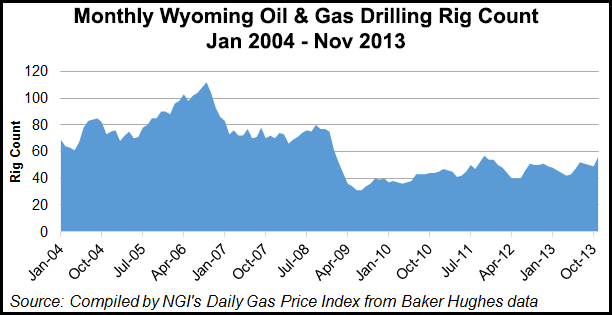NGI Archives | NGI All News Access
Wyoming Governor Seeks Four-Year Well-Plugging Plan
Wyoming Gov. Matt Mead on Tuesday unveiled a four-year plan to accelerate the plugging of more than 1,200 abandoned oil and natural gas wells on state and fee lands. The proposal will be given Thursday to the state legislature’s Joint Minerals Committee, which requested a plan be presented at that meeting.

The move to accelerate efforts to complete well plugging would require action by the state legislature and involve several state agencies, including the Oil/Gas Conservation Commission (OGCC), Department of Environmental Quality, Office of State Lands and the State Engineer.
“The $3 million proposal is in the governor’s budget that now goes to the state legislature,” Mead spokesperson Renny MacKay told NGI. “So [state lawmakers] must act on that part of it. While the other action items in the plan do not require changes in law the governor is seeking legislative input on the plan.”
Mead’s plan calls for at least 305 wells to be plugged annually during the next four years. It also identifies other possible wells that might need to be plugged by the state and addresses them, too. At present, MacKay said there is no data on how much, if any, methane leakage has occurred at the idle wells
Under the proposal, the OGCC is directed to hire a project manager to focus on the plugging effort, which would be separate from plugging taken care of on other wells by the private sector. “It also identifies steps to ensure wells are adequately bonded in the future and do not become the responsibility of the state,” Mead said.
Mead also is recommending that OGCC review its bond requirements for oil and gas wells and review the state conservation tax, which helps fund plugging and reclamation efforts. The plan also would have OGCC establish “minimum standards” for plugging and reclaiming orphaned wells.
“Energy production and environmental stewardship are inextricably connected,” Mead said. “Plugging wells and reclaiming the land are expensive endeavors, but they are necessary to minimize disturbance to landowners and to safeguard our land, water and wildlife.”
Mead emphasized that many of the currently idle wells are slated to be taken care of by private-sector operators, and he expressed appreciation for the companies acting responsibly and “promoting good performance.”
Given his proposal for the state “actively monitoring” the situation, Mead said adjustments can be made as the program moves along.
© 2024 Natural Gas Intelligence. All rights reserved.
ISSN © 1532-1231 | ISSN © 2577-9877 |
